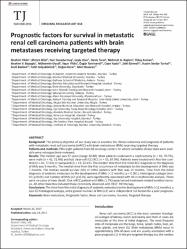| dc.contributor.author | Yıldız, İbrahim | |
| dc.contributor.author | Bilici, Ahmet | |
| dc.contributor.author | Karadurmuş, Nuri | |
| dc.contributor.author | Özer, Leyla | |
| dc.contributor.author | Tural, Deniz | |
| dc.contributor.author | Kaplan, Mehmet Ali | |
| dc.contributor.author | Akman, Tülay | |
| dc.contributor.author | Bayoğlu, İbrahim Vedat | |
| dc.contributor.author | Uysal, Mükremin | |
| dc.contributor.author | Yıldız, Yaşar | |
| dc.contributor.author | Tanrıverdi, Özgür | |
| dc.contributor.author | Yazıcı, Ozan | |
| dc.contributor.author | Sürmeli, Zeki | |
| dc.contributor.author | Turhal, Nazim Serdar | |
| dc.contributor.author | Bavbek, Sevil | |
| dc.contributor.author | Selçukbiricik, Fatih | |
| dc.contributor.author | Koca, Doğan | |
| dc.contributor.author | Başaran, Mert | |
| dc.date.accessioned | 10.07.201910:49:13 | |
| dc.date.accessioned | 2019-07-10T19:49:57Z | |
| dc.date.available | 10.07.201910:49:13 | |
| dc.date.available | 2019-07-10T19:49:57Z | |
| dc.date.issued | 2018 | en_US |
| dc.identifier.citation | Yıldız, İ., Bilici, A., Karadurmuş, N., Özer, L., Tural, D., Kaplan, M. ... Başaran, M. (2018). Prognostic factors for survival in metastatic renal cell carcinoma patients with brain metastases receiving targeted therapy. TUMORI J, 104(6), 444-450. https://dx.doi.org/10.5301/tj.5000635 | en_US |
| dc.identifier.issn | 0300-8916 | |
| dc.identifier.issn | 2038-2529 | |
| dc.identifier.uri | https://dx.doi.org/10.5301/tj.5000635 | |
| dc.identifier.uri | https://hdl.handle.net/20.500.12511/1831 | |
| dc.description | WOS: 000454667200024 | en_US |
| dc.description | PubMed ID: 28731496 | en_US |
| dc.description.abstract | Background: The primary objective of our study was to examine the clinical outcomes and prognosis of patients with metastatic renal cell carcinoma (mRCC) with brain metastases (BMs) receiving targeted therapy. Patients and methods: Fifty-eight patients from 16 oncology centers for whom complete clinical data were available were retrospectively reviewed. Results: The median age was 57 years (range 30-80). Most patients underwent a nephrectomy (n = 41; 70.7%), were male (n = 42; 72.4%) and had clear-cell (CC) RCC (n = 51; 87.9%). Patients were treated with first-line suni-tinib (n = 45; 77.6%) or pazopanib (n = 13; 22.4%). The median time from the initial RCC diagnosis to the diagnosis of BMs was 9 months. The median time from the first occurrence of metastasis to the development of BMs was 7 months. The median overall survival (OS) of mRCC patients with BMs was 13 months. Time from the initial diagnosis of systemic metastasis to the development of BMs (<12 months; p = 0.001), histological subtype (non-CC; p<0.05) and number of BMs (>2; p<0.05) were significantly associated with OS in multivariate analysis. There were no cases of toxic death. One mRCC patient with BMs (1.7%) experienced treatment-related cerebral necrosis. All other toxicities included those commonly observed with VEGF-TKI therapy. Conclusions: The time from the initial diagnosis of systemic metastasis to the development of BMs (<12 months), a non-CC histological subtype, and a greater number of BMs (>2) were independent risk factors for a poor prognosis. | en_US |
| dc.language.iso | eng | en_US |
| dc.publisher | Sage Publications Ltd | en_US |
| dc.rights | info:eu-repo/semantics/embargoedAccess | en_US |
| dc.subject | Brain Metastasis | en_US |
| dc.subject | Prognostic Factor | en_US |
| dc.subject | Renal Cell Carcinoma | en_US |
| dc.subject | Survival | en_US |
| dc.subject | Targeted Therapy | en_US |
| dc.title | Prognostic factors for survival in metastatic renal cell carcinoma patients with brain metastases receiving targeted therapy | en_US |
| dc.type | article | en_US |
| dc.relation.ispartof | TUMORI J | en_US |
| dc.department | İstanbul Medipol Üniversitesi, Tıp Fakültesi, Dahili Tıp Bilimleri Bölümü, İç Hastalıkları Ana Bilim Dalı | en_US |
| dc.identifier.volume | 104 | en_US |
| dc.identifier.issue | 6 | en_US |
| dc.identifier.startpage | 444 | en_US |
| dc.identifier.endpage | 450 | en_US |
| dc.relation.publicationcategory | Makale - Uluslararası Hakemli Dergi - Kurum Öğretim Elemanı | en_US |
| dc.identifier.doi | 10.5301/tj.5000635 | en_US |
| dc.identifier.wosquality | Q4 | en_US |


















